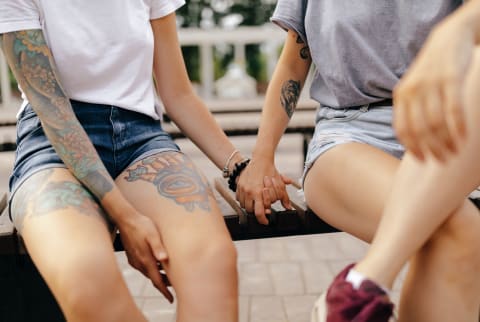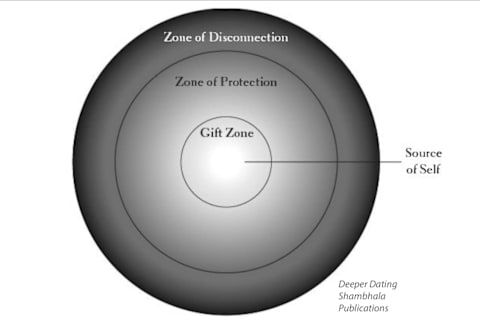Advertisement
Your Core Wounds Could Help You Unlock Deeper Intimacy — Here's How


We all have aspects of ourselves we don't especially care for, whether that's feeling like we're too much—or even not enough. But what if, hiding behind those very insecurities and core wounds, you discovered your greatest gifts had been there all along?
This is the paradox of the Gift-Wound matrix, and understanding it is essential to deepening intimacy, improving relationships, and showing up in the world as your most authentic self.
The formation of the core wound
The idea of the Gift-Wound matrix comes from therapist and relationship expert Ken Page, LCSW, through his own personal journey, as well as his work with clients.
For Page, his journey began with feeling ashamed and embarrassed by his tenderness and sensitivity at a young age. "All these things that weren't boyish—they were my places of deepest shame—so I became shut down," Page explains. "I knew the smartest thing for me to do would be to hide these things, which meant I turned against myself."
Eventually, however, trying to be someone he wasn't only led to self-sabotage. "All of the different things I tried to do couldn't succeed like they needed to succeed because I wasn't being me," Page reflects.
This would become a point of interest in his work with clients, where he discovered that not only was his sensitivity what drew clients to him, but many clients also struggled with core wounds of their own.
"We share who we are, and then we get shamed, humiliated, and disappointed. Little by little, we realize those parts of ourselves that are so authentic, these core gift places, are going to get us in trouble. So, we decide to leave those parts behind in order to make it in the world," Page says.
For example, take someone who has a core wound around feeling too needy. This is actually a gift for giving and receiving genuine love and care. As another example, someone who has a core wound around feeling too different likely has a gift of creativity or innovation.
We might find ourselves thinking that if we were to be ourselves, we would be overwhelming, too much, too different...not independent enough, not strong enough, not enough in general, etc., etc., etc...but then we stomp out the light that makes us who we are.
Peeling back the layers to our core gift
Taking a look at the below, we see a depiction of the "layers" or "armor" we tend to build up around core gifts.

In the gift zone, our core gifts can be freely expressed and we thrive. As Page explains, our deepest humanity is in the gift zone, and it's the key to a rich and meaningful life. "But because our wounds are there, because we've gotten in trouble again and again by showing these parts," he says, "we protect ourselves and we move out toward the zone of protection."
In the zone of protection, we begin to numb ourselves. We feel more defensive and separate, even if we think we're more protected, because we've lost our center.
Eventually, we can find ourselves in the zone of disconnection, where we've completely alienated ourselves from these core gifts within. "And that's a place of existential pain. It's a really, really hard place. It's where we've protected ourselves so much that we've lost contact with our humanity," Page explains.
Our task, then, is to build up the skills that allow us to live in deeper alignment with these core gifts in our gift zone, peeling back the layers of protection and disconnection.
Why reclaiming your core gifts unlocks deeper intimacy
Think of your core gifts like your spine. In the animal kingdom, if you don't have a spine (an endoskeleton), you need armor (an exoskeleton).
Exoskeletons might be great if you're warding off predators, but for humans who crave intimacy, emotional armor doesn't exactly help with deepening connections. Of course, when we're operating from our wounds and denying our core gifts, that armor is automatically enabled.
When we can learn to drop the armor and live from our core gifts (with that strong metaphorical spine), we're essentially owning who we are. "It's being organized around honoring our authentic self. It's to claim those parts of ourselves that we disowned and learn to cherish them," Page tells mindbodygreen.
Once we do that, he says, we unlock a new level of authenticity, vulnerability, and intimacy in every aspect of our lives because we're now operating from the inside out.
As Page puts it, the degree to which we do not name, honor, and champion our core gifts is the degree to which we will feel emptiness—and end up attracted to situations that don't honor who we.
The degree to which we can name our core gifts and honor them, however, is the degree to which we end up romantically, sexually, professionally, and personally attracted to situations and people that treasure those parts of ourselves.
A step-by-step process to identify your core gifts
Journal about what makes you feel good and why
If you want to get started identifying your core gifts, you'll first want to grab a journal. As Page suggests, begin by simply writing down the things that fill your heart—and why.
Ask yourself what gives you a sense of peace and gratification, especially in your interactions with other people. Start to notice the things that light you up, but beyond just noticing them, study them further.
Page suggests asking things like, What in this made me feel good? What was the good feeling? Is this a good feeling I've had before in the past? What core gift might have been activated here?
Honor your own sensitivity
We tend to tell ourselves we're being too sensitive when our feelings are hurt—but that's not how you'll get to the bottom of your personal Gift-Wound matrix. According to Page, you'll want to dignify your feelings in order to inspect them further.
Notice the things that hurt your heart and dig deeper into the why. Instead of asking yourself how you can be stronger or move on, ask yourself how it makes sense that this hurt you.
Page recommends asking questions like, Might there have been a core gift that was stepped on? Perhaps this was a core gift that was once stepped on in the past? If there was a gift that was not honored in the interaction, what would that gift be?
Identify your true support system
Humans need each other—there's no way around that. As such, it's essential to find people with whom you feel your core gifts are seen, understood, and celebrated.
As Page tells mindbodygreen, "We hear all this stuff about self-esteem, but the truth is, we often learn self-esteem by having people see us in our most vulnerable spots and showing us what's beautiful about those spots. We need that."
So, start thinking about people who support your core gifts, and make a point to surround yourself with them, as opposed to those who do not. "If you want to learn to honor your core gift, you can't do it without your tribe," Page adds.
Ask your support system for feedback
Speaking of your tribe, they may already have a sense of what your core gifts are—all you have to do is ask. To that end, Page recommends reaching out to a trusted friend or two and simply asking them what they think your core gifts are.
It's a vulnerable activity, to be sure, so reserve it for someone who definitely has your best interests at heart (and you can return the favor).
Here's a rough idea of what you can say, according to Page: "I'm working on understanding my core gifts, and as my close friend, I would like to hear what you see as my deepest gifts. I will do the same back for you."
If you're still feeling hesitant, Page assures us that his clients often say this is a highlight on their Gift-Wound matrix journey. It's rare for us to share these kinds of things with friends, but it can feel incredibly validating, so don't be afraid to give each other the gift of true recognition.
Begin to live from a more authentic place
Finally, Page says, as you keep noticing, dignifying, and validating the things that don't feel right—and moving toward the things that fill your heart—the "spine" of your core gifts will get stronger and stronger.
You begin to lean into joy, recognizing it as a portal to something sacred. Operating from your core gifts becomes easier and far more liberating than operating from the zones of protection and disconnection.
And when we do this, Page says, we're more likely to attract deep intimacy in our lives and less likely to put up with bad behavior.
"You'll increase and cultivate your sense of discrimination, express yourself more freely and fully, and be connected to your own joy in deeper ways," Page notes, adding, "You'll scare yourself a little bit by the size of who you become, but that means feeling more alive."
The takeaway
None of us are strangers to embarrassment, shame, and deep inner wounds, but our own wounds are often merely armor for the beating heart of our humanity within. And while you'll have to do some self-exploration to figure out the specific flavor of your unique Gift-Wound matrix, it's well worth the effort.
"Your life journey becomes an adventure when you act on your core gifts," Page says in closing. "Doing so changes your relationships from the inside out, ushering in a wave of self-expression that ripples into the ways you love—and the very way you live."